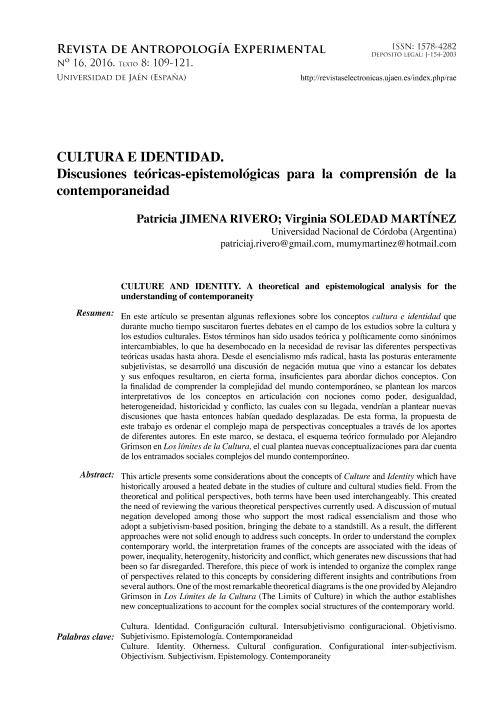Artículo
En este artículo se presentan algunas reflexiones sobre los conceptos cultura e identidad que durante mucho tiempo suscitaron fuertes debates en el campo de los estudios sobre la cultura y los estudios culturales. Estos términos han sido usados teórica y políticamente como sinónimos intercambiables, lo que ha desembocado en la necesidad de revisar las diferentes perspectivas teóricas usadas hasta ahora. Desde el esencialismo más radical, hasta las posturas enteramente subjetivistas, se desarrolló una discusión de negación mutua que vino a estancar los debates y sus enfoques resultaron, en cierta forma, insuficientes para abordar dichos conceptos. Con la finalidad de comprender la complejidad del mundo contemporáneo, se plantean los marcos interpretativos de los conceptos en articulación con nociones como poder, desigualdad, heterogeneidad, historicidad y conflicto, las cuales con su llegada, vendrían a plantear nuevas discusiones que hasta entonces habían quedado desplazadas. De esta forma, la propuesta de este trabajo es ordenar el complejo mapa de perspectivas conceptuales a través de los aportes de diferentes autores. En este marco, se destaca, el esquema teórico formulado por Alejandro Grimson en Los límites de la Cultura, el cual plantea nuevas conceptualizaciones para dar cuenta de los entramados sociales complejos del mundo contemporáneo. This article presents some considerations about the concepts of Culture and Identity which have historically aroused a heated debate in the studies of culture and cultural studies field. From the theoretical and political perspectives, both terms have been used interchangeably. This created the need of reviewing the various theoretical perspectives currently used. A discussion of mutual negation developed among those who support the most radical essencialism and those who adopt a subjetivism-based position, bringing the debate to a standstill. As a result, the different approaches were not solid enough to address such concepts. In order to understand the complex contemporary world, the interpretation frames of the concepts are associated with the ideas of power, inequality, heterogenity, historicity and conflict, which generates new discussions that had been so far disregarded. Therefore, this piece of work is intended to organize the complex range of perspectives related to this concepts by considering different insights and contributions from several authors. One of the most remarkable theoretical diagrams is the one provided by Alejandro Grimson in Los Límites de la Cultura (The Limits of Culture) in which the author establishes new conceptualizations to account for the complex social structures of the contemporary world.
Cultura e identidad. Discusiones teóricas-epistemológicas para la comprensión de la contemporaneidad
Título:
Culture and identity. A theoretical and epistemological analysis for the understanding of contemporaneity
Fecha de publicación:
10/2016
Editorial:
Universidad de Jaen
Revista:
Revista de Antropología Experimental
e-ISSN:
1578-4282
Idioma:
Español
Tipo de recurso:
Artículo publicado
Clasificación temática:
Resumen
Palabras clave:
Cultura
,
Identidad
,
Configuracion Cultural
,
Ntersubjetivismo
Archivos asociados
Licencia
Identificadores
Colecciones
Articulos(CCT - CORDOBA)
Articulos de CTRO.CIENTIFICO TECNOL.CONICET - CORDOBA
Articulos de CTRO.CIENTIFICO TECNOL.CONICET - CORDOBA
Articulos(CIECS)
Articulos de CENTRO DE INVESTIGACIONES Y ESTUDIO SOBRE CULTURA Y SOCIEDAD
Articulos de CENTRO DE INVESTIGACIONES Y ESTUDIO SOBRE CULTURA Y SOCIEDAD
Citación
Rivero, Patricia Jimena; Martínez, Virginia Soledad; Cultura e identidad. Discusiones teóricas-epistemológicas para la comprensión de la contemporaneidad; Universidad de Jaen; Revista de Antropología Experimental; 16; 10-2016; 109-121
Compartir




